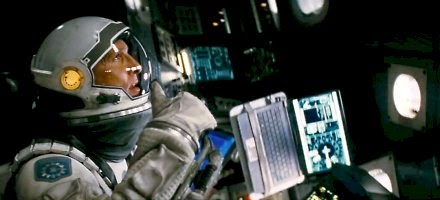
Directed by Christopher Nolan
Clocking in at close to three hours, Interstellar is never boring. It is set in fervidly imagined worlds of stark beauty and uncertain promise. It is also peppered with clichés and crammed with big ideas. It makes you cringe and drop your jaw, at times in the same breath. And because it’s by Chris Nolan (Inception, Memento), it keeps you wondering if the guy has bitten off more than he could chew this time.
Nolan has no lack of ambition or imagination. He makes movies that no one is allowed to make anymore: too cerebral, too long, too messed up to suit everyone’s taste. Interstellar starts off looking like it’s set in the Great Depression, until it slowly dawns on us that this particular world is one in which the Creationists (and conspiracy theorists) have obviously won. Textbooks have been re-written to correct the “hoax” that was the Apollo moon landing, NASA has been driven underground, and a former astronaut like Cooper (Matthew McConaughey) is reduced to being a corn farmer (although he prefers the generic title of engineer). There’s a lot of expository dialogue, techno-babble, and New Age colloquy conveyed with gravity — no pun intended — and often with copious tears.
That’s not an objection, by the way. No one but the truly unsuspecting goes into a Nolan film looking for a smooth ride. You can not accuse the man of intellectual pampering. Long may he continue doing movies his way and polarizing audiences. As a fence-sitter, I only hope he outgrows his penchant for using loud music to generate false excitement. It was irritating having my friend Therese dig her nails into my arm every time Hans Zimmer’s score rose to a bone-rattling crescendo. “What’s wrong with you?” I had to tell her at one point (even as I was tempted to direct my remark at the screen as well). “Can’t you see nothing’s happening?”
For all its science-fiction trappings, the movie knows where its bleeding heart lies. Now there’s a complaint in there somewhere. Nolan is too consumed with ideas to paint his characters in anything but the broadest strokes. Instead of endowing them with personalities, he makes them mouthpieces for self-indulgent philosophical treatises. Matt Damon turns up in an uncredited cameo to muse on loneliness shortly before setting in motion one of the film’s more spectacular sequences. At least Nolan knows to stop the conversation long enough for us to enjoy the CGI work.
In the end, Interstellar is not deep as it is ponderous. Its meditations on love, life, and family aren’t something you haven’t encountered in your Facebook feed. My friend has been bugging me for the full text of Dylan Thomas’s “Do Not Go Gentle Into That Good Night” ever since. The poem certainly imbues the film with more urgency than the soundtrack does, although it’s not of a piece with the feel-good ending, which seems like a concession to test screening feedback. The scenario is worth another twist, but I bet even Nolan will be hard put to justify it. Cue loud music. Roll credits. In space, no one can hear you scream “harang!”
This post has no comments.
Post a Comment